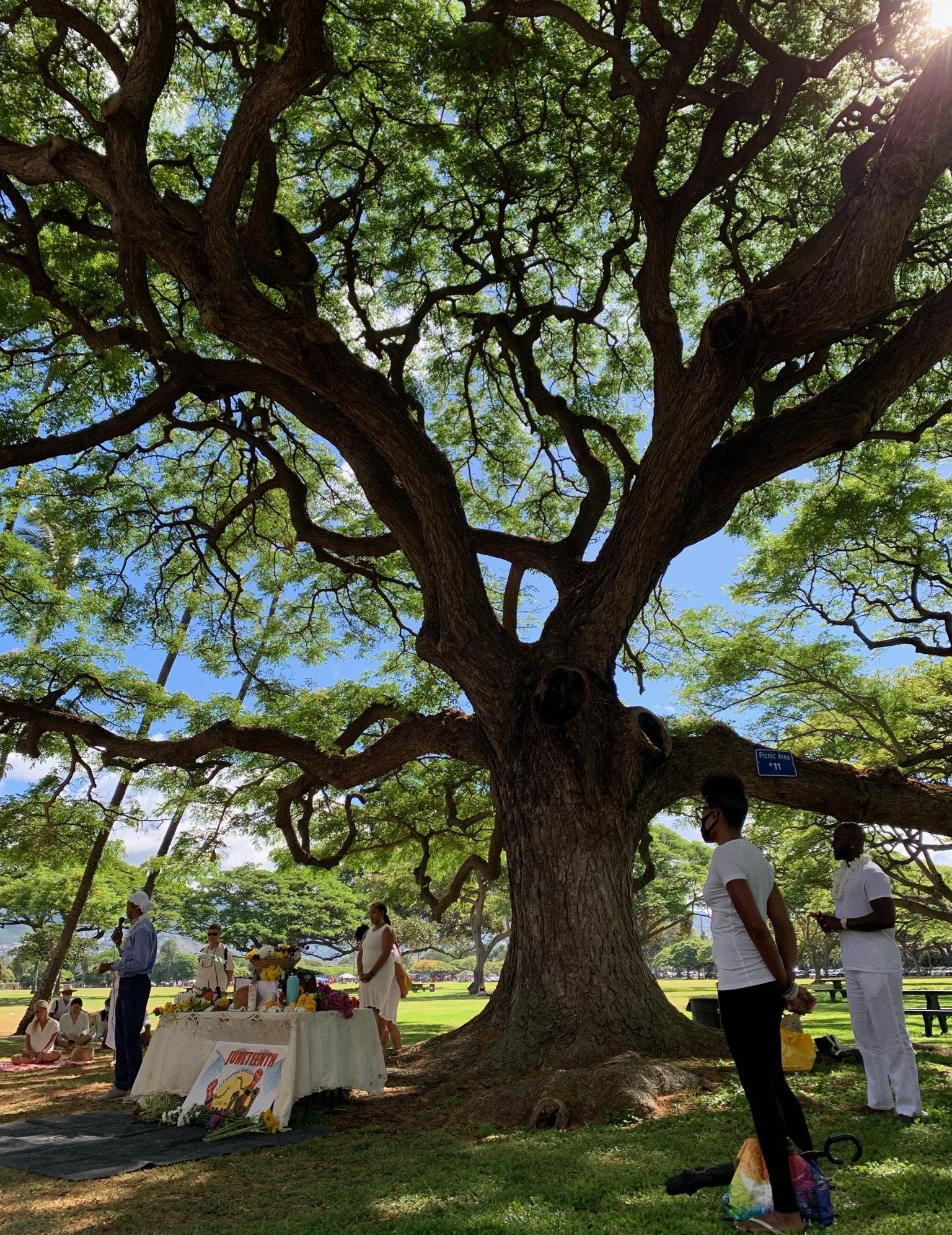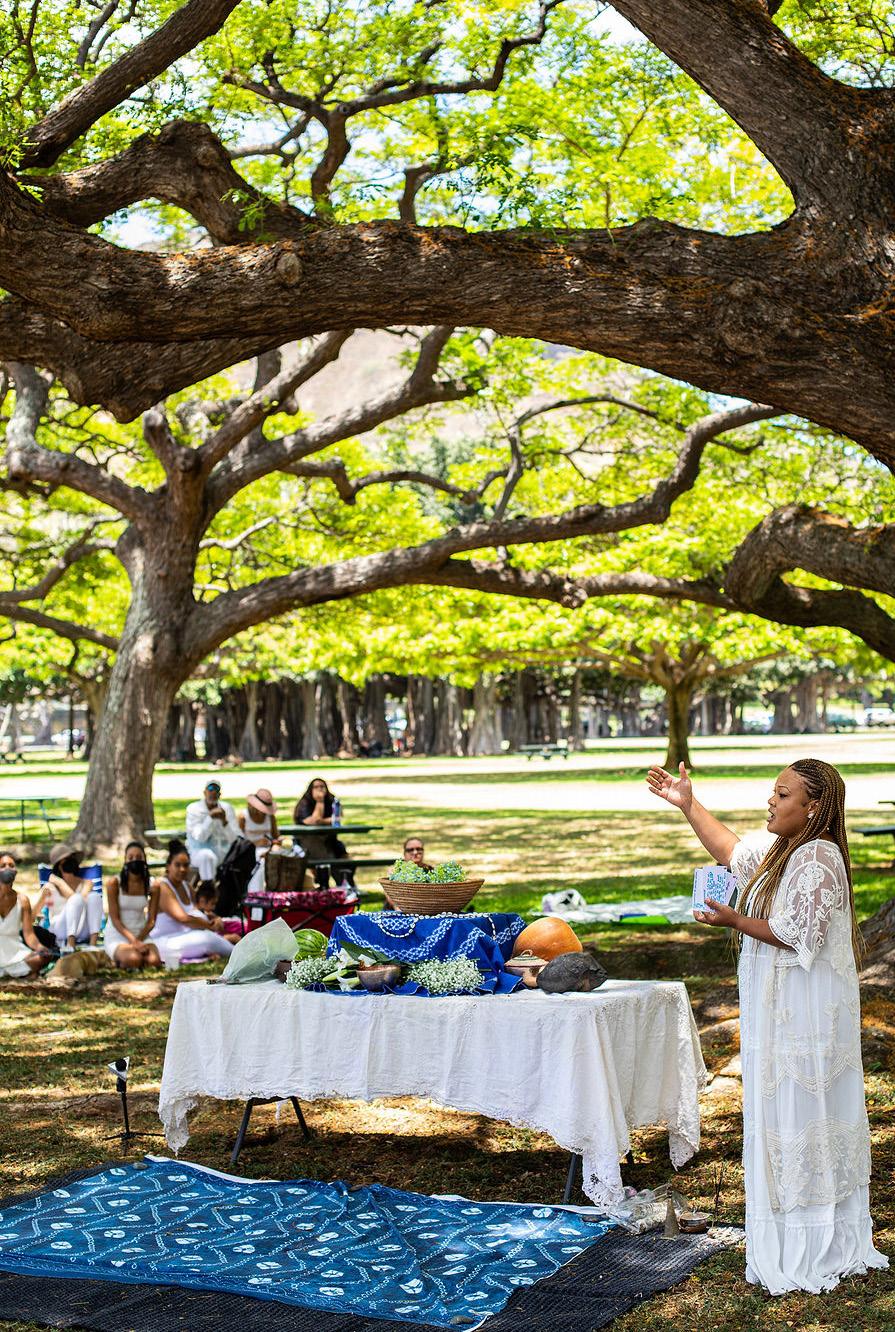

in Hawaiʻi
What is Juneteenth?
The Juneteenth holiday commemorates June 19, 1865 when US trroops arrived on Galveston Island, Texas to enforce the Emancipation Proclamation, finally formally ending the US Civil War and the institution of forced labor, genocide, and enslavement of African people that had been an economic engine for nearly 300 years.
Though the Emancipation Proclamation had been issued two years earlier in 1863 and the losing Confederates surrendered in April of 1865, enslavers in Texas continued to force captive Black people to work, stealing their labor and keeping them from their families.
Immediately, newly freed people on Galveston Island went looking for their loved ones, celebrated, and began doing all they could to build new lives.
Though there are many important emancipation dates observed by Black communities across the US, Juneteenth has become a widely shared symbolic moment of reflection and celebration, finally becoming a federal holiday in 2021.
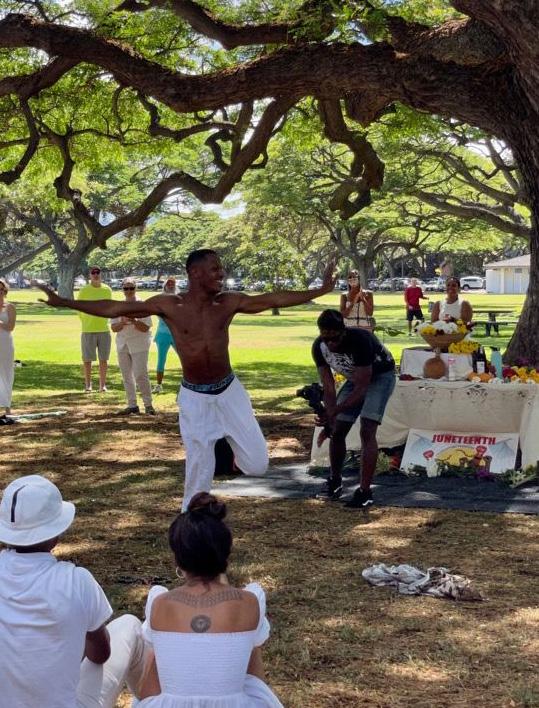 Juneteenth celebrations at Kapiʻolani Park, 2021
Juneteenth celebrations at Kapiʻolani Park, 2021
Why Juneteenth
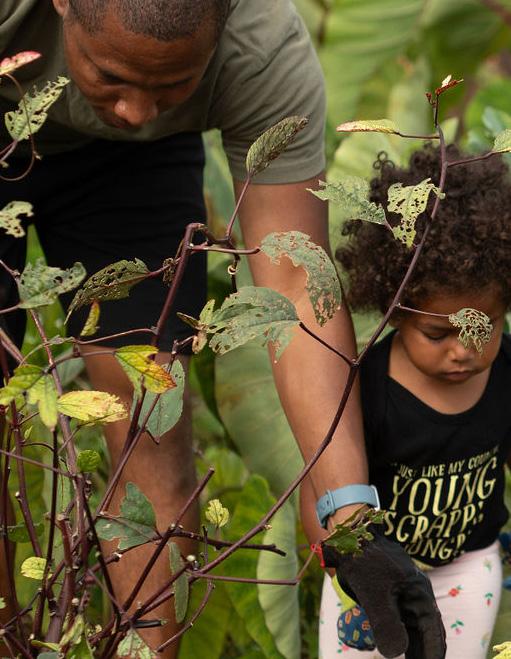
Why do we celebrate Juneteenth in Hawai'i?
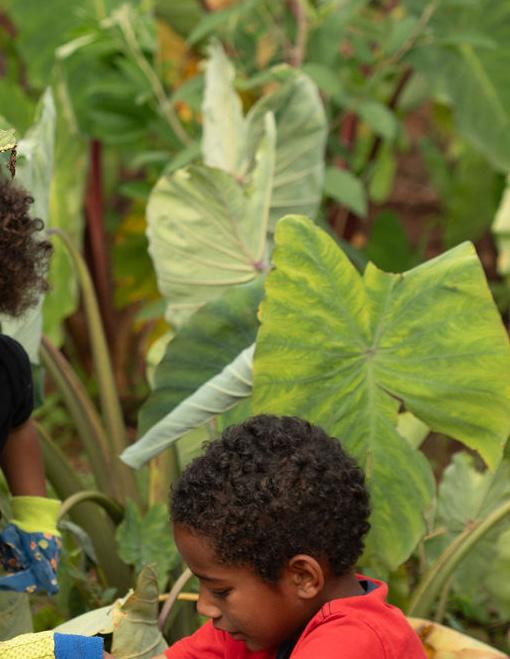
Juneteenth has been observed in Hawaiʻi at least since the late 1980s, when African American church congregations and small groups of families gathered in jubilant celebration.
For those of us living in Hawaiʻi who are descendants of enslaved Africans in the Americas, and in the US specifically, the Juneteenth holiday is a time to commemorate the historic joy of that first June 19th. It is also a time to reflect on the need to pursue true freedom, safety, and agency for our people.
We do so by engaging in cultural protocols that honor our ancestors and by joining community celebrations that center a spirit of kinship, community, and hopefulness for the future. Just as our forebearers did, we celebrate in anticipation of a just, inclusive world that is on its way.
Juneteenth is a celebration of resilience and strength; it reminds all people that oppressive structures can radically change and that legal and cultural traditions of dehumanization
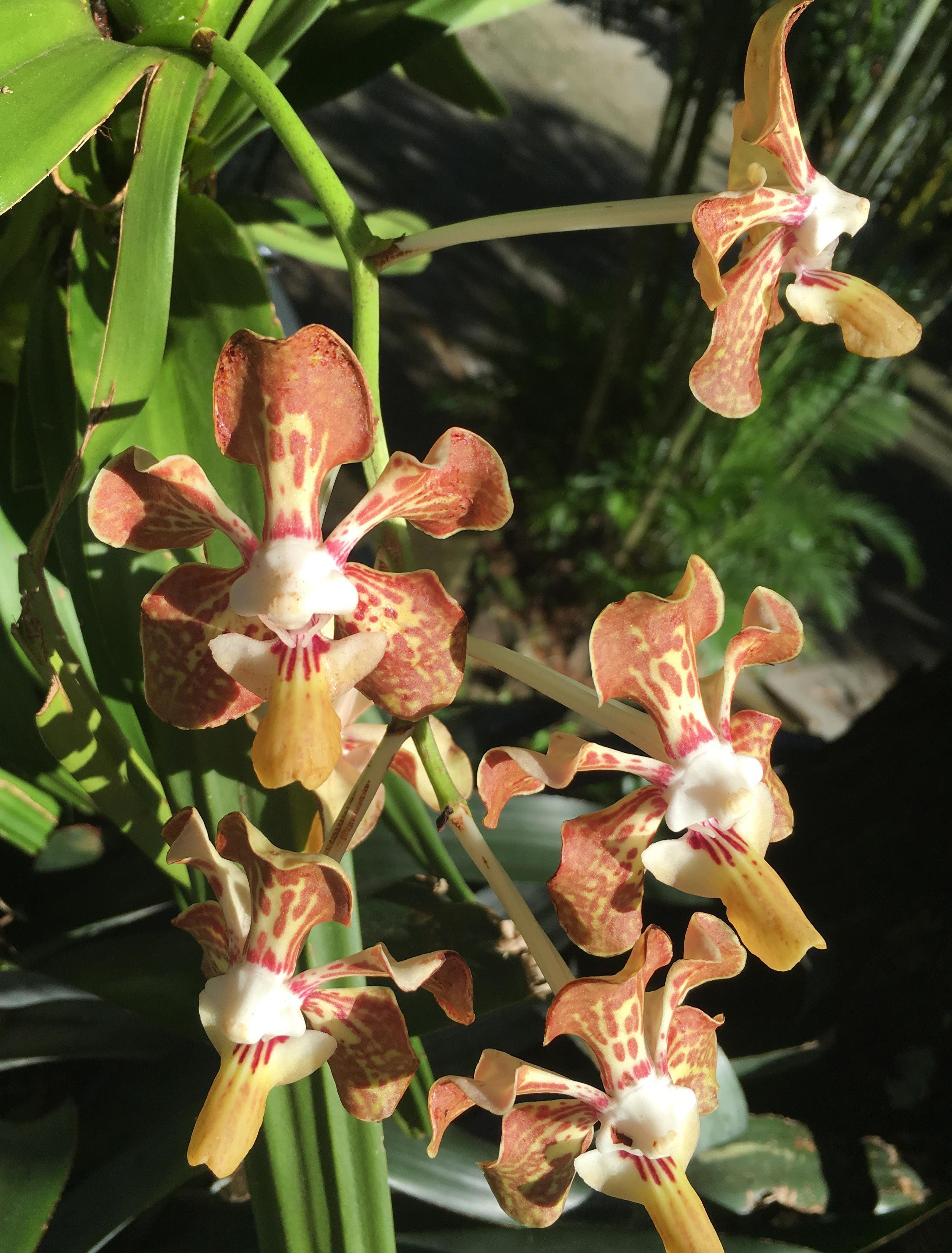
of Black people, and any people, must end.
The recognition of this important day in Hawai’i uplifts and makes visible our Black community in Hawai’i who contribute to Hawaiʻi as leaders, innovators, entrepreneurs, educators, athletes, artists, cultural practitioners, activists, environmentalists, healthcare professionals, scientists, attorneys, policymakers, and much more.
Throughout Hawaiʻi, Black community organizations, spiritual communities, businesses, and others honor the complex histories of Black life in the US while also acknowledging the specificity of Black experiences in Hawaiʻi, a place where our people have always been free.
The Hawaiian Kingdom &Slavery
Though it had diplomatic and economic relationships with the United States, the Kingdom of Hawaiʻi observed the economic and human rights implications of American slavery long before US interests overthrew the Hawaiian government. The US Congress passed the Fugitive Slave Act in 1850, making it a crime to provide a haven to enslaved people who escaped to free territory. The 1852 constitution of Hawaiʻi expressly outlawed slavery:
12. Paukū 12. ‘A‘ole loa e noho kauā kuapa‘akekahi kanaka ma lalo o kekahi ma ko Hawai‘i nei Pae ‘Āina; inā ho‘i e hiki mai kekahi kauā kuapa‘a i kēia Pae ‘Āina, ‘o kona kuapa‘a ‘ole nō ia, a ‘o nā mea lawe mai i ke kauā kuapa‘a i loko o ke aupuni o ka Mō‘ī, e nele nō ia i nā pono a pau o kēia aupuni; akā ho‘i, ‘a‘ole nō e hō‘ole ‘ia ka noho kuapa‘a ‘ana o kekahi, ke ho‘opa‘i ‘ia ‘o ia no ka hewa e like me ke kānāwai.
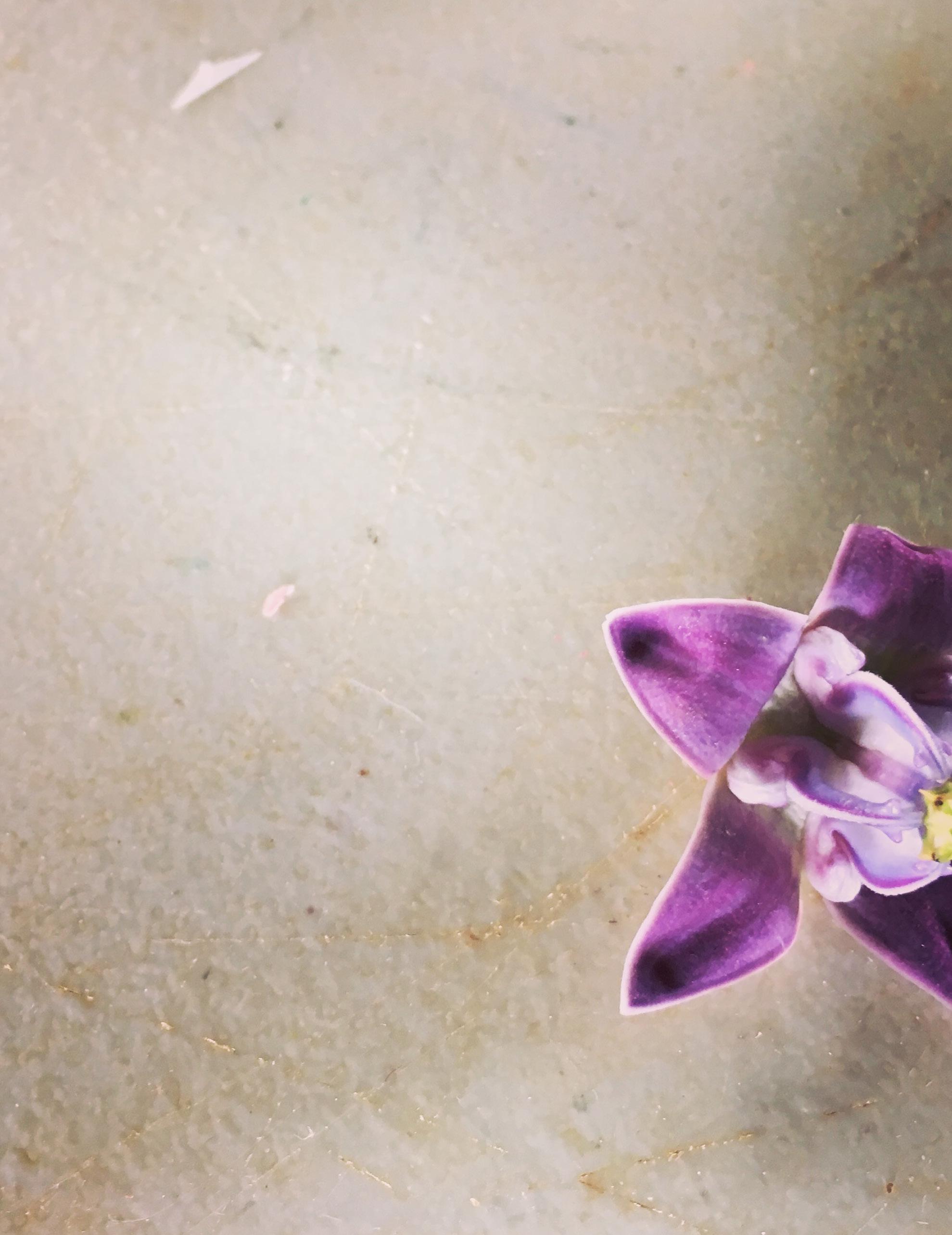
12. Art. 12. Slavery shall, under no circumstances whatever, be tolerated in the Hawaiian Islands: whenever a slave shall enter Hawaiian territory he shall be free; no person who imports a slave, or slaves, into the King’s dominions shall ever enjoy any civil or political rights in this realm; but involuntary servitude for the punishment of crime is allowable according to law.
The Pacific Slave Trade
“Blackbirding”:
The end of slavery in the United States shifted the enterprise to other locations, notably to the Pacific Islands, where thousands of Indigenous people were kidnapped and trafficked for forced labor in the Americas, Australia, and on other Pacific Islands. The reverberations are still felt in our region today.
The Pacific slave trade began in the 19th century and continued through the early 20th century. Euphemistically called “blackbirding,” the practice hunted and captured Indigenous Pacific Islanders for labor trafficking on plantations run by Europeans across the region.
Blackbirding ships began operations in the Pacific from the 1840s and continued into the 1930s. In the 1860s, Peruvian blackbirders sought workers at their haciendas and to mine the guano deposits on the Chincha Islands.
From the late 1860s, the blackbirding trade focused on supplying laborers to plantations, particularly those producing sugar cane in Queensland in Australia and in Fiji.
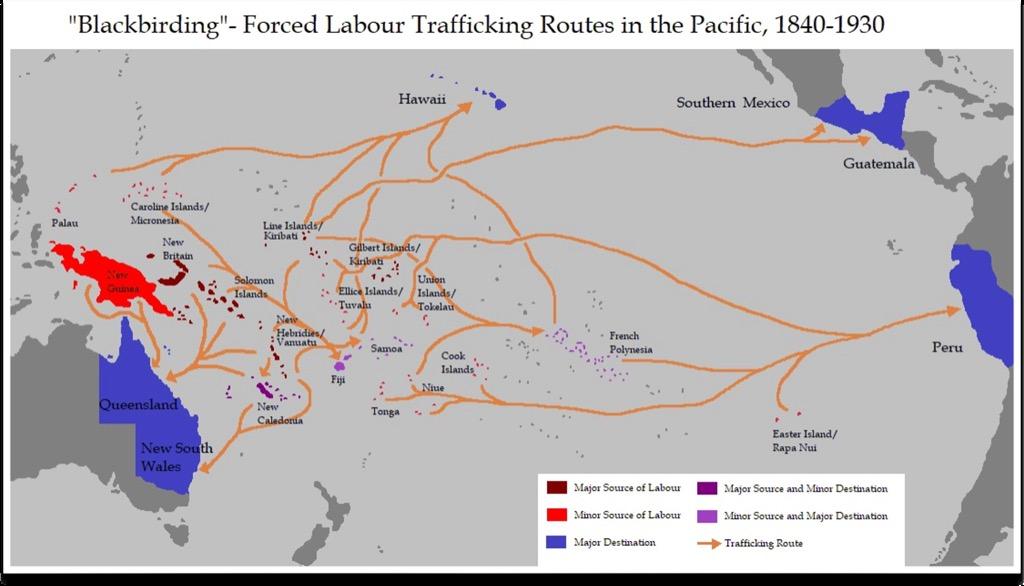
and celebrate the official end of enslavement in the US, we should acknowledge that the violence of slavery and the inequality that has followed in its wake are global phenomena.
Today, the and colonial violence in New Caledonia/ Kanaky and West Papua and unrest in Vanuatu are echos of the destabilization the Pacific slave trade and colonization brought to the region.
This year, as the Festival of Pacific Arts and Culture is hosted in Honolulu, several delegations remind us of the lasting impact of slavery on Pacific Island communities. For many with roots in the United States, this history is unknown. As we observe Juneteenth
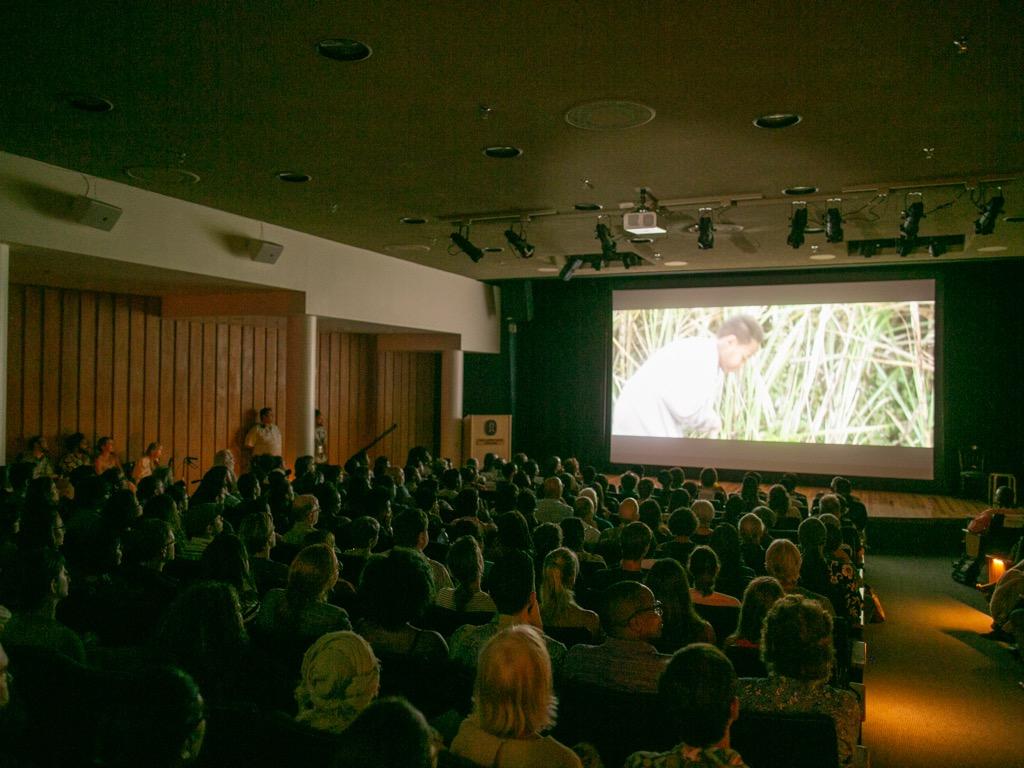


A full house views the Honolulu African American Film Festival’s presentation of Blackbird at Honolulu Museum of Art in 2018. The film, by Australia-based filmmaker Amie Batalibasi depicts the tragic consequences of the human trafficking of a pair of teenaged siblings from the Solomon Islands to Australia to labor on a sugar plantation in the 1860s.

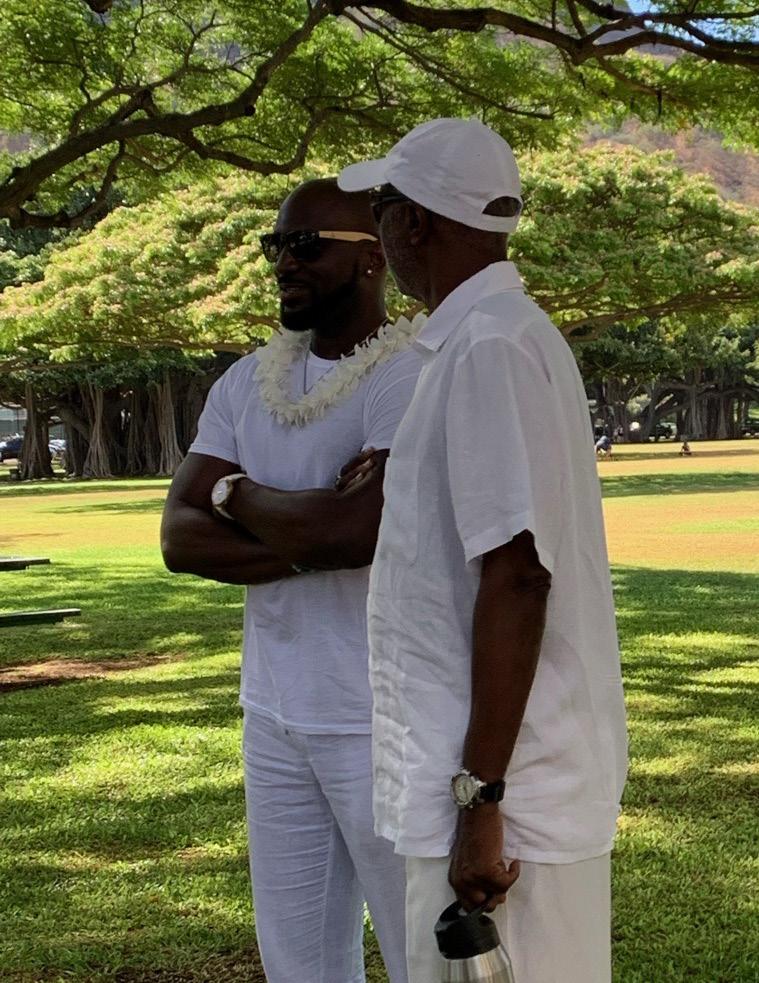
Frequently asked
Juneteenth celebrations at Kapiʻolani Park, 2021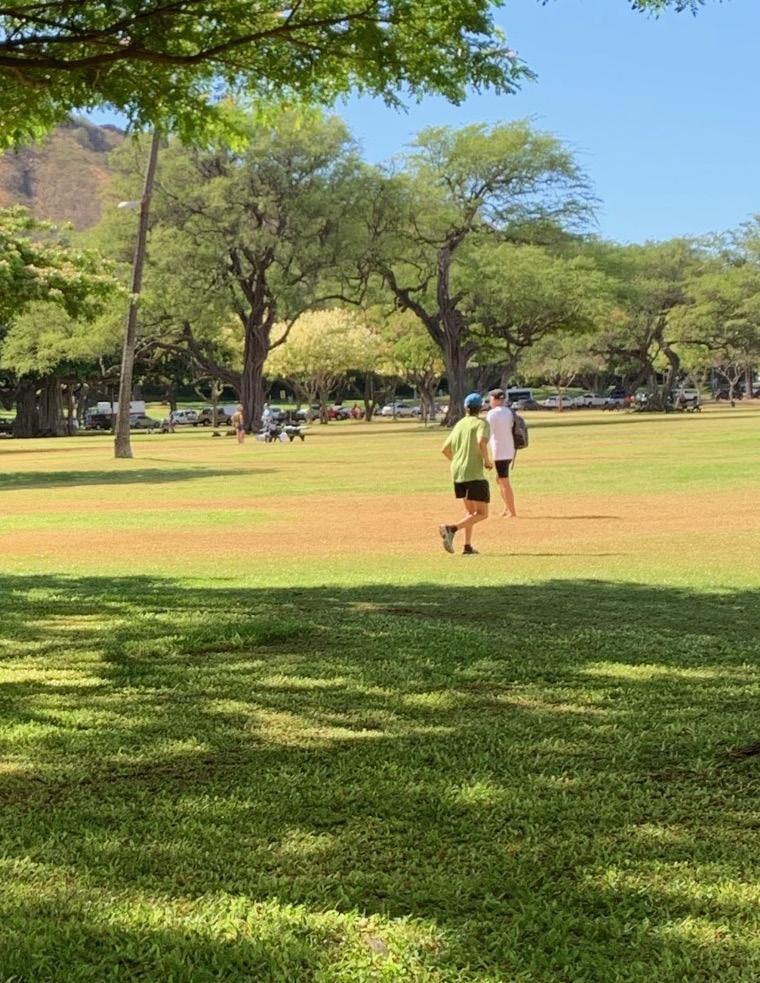
Where does the name of the holiday come from?
Juneteenth is a contraction or portmanteau of the words “June” and “nineteenth.” Juneteenth celebrates the date of June 19, 1865, when enslaved people of African descent located in Galveston, Texas, finally learned of their freedom.
How do people commonly celebrate?
Juneteenth is a time for African Americans to celebrate their heritage and there are many ways people celebrate the day including parades, marches, and barbecues, and cultural events. Many communities gather for ceremonies that include prayer, public service awards, and the raising of the Juneteenth Flag. Celebrations honoring ancestors may include the wearing of white attire and consuming red-colored foods and drinks, hues that in many of the West African cultures of our ancestors, are symbols of strength, spirituality, and life and death.
Government and educational institutions often host programs or provide information regarding the history of the holiday and the Emancipation Proclamation. In Hawaiʻi, community organizations and churches have traditionally hosted public celebrations and arts events throughout the week and weekend nearest to June 19.
Can I celebrate Juneteenth if I’m not Black?
In the past, Juneteenth was mainly known and celebrated by Black people in the US south, especially among Black Texans. Now that Juneteenth is a federal holiday, some businesses and organizations take the day off for a three-day weekend. Ideally, people of all cultures can celebrate Juneteenth in ways that recognize that the holiday is particularly special for Black Americans by centering our cultural heritage and traditions.
In recent years, as Juneteenth has become more widely known, many businesses have attempted to capitalize on the holiday in ways that inadvertently alienate the Black community. If your business or organization is interested in honoring the day, be sure to take the lead of Black-led organizations and leaders to ensure cultural appropriateness in your messaging.
How can I educate myself and others about Juneteenth?
The Internet abounds with resources about the history and traditions of Juneteenth. Start with an intentional Google dive, but also observe and learn from Black organizations and leaders in our community in Hawaiʻi.
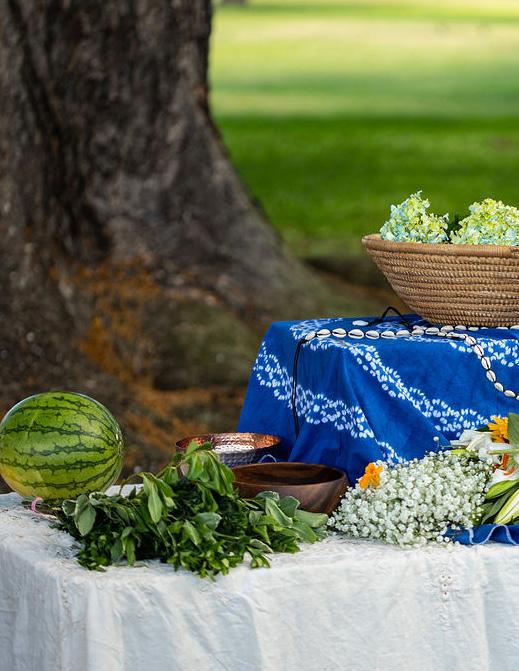
Cultural protocols connect us to our ancestors
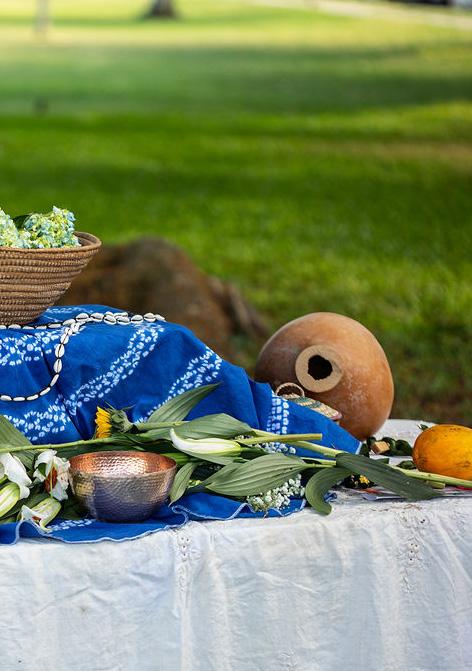
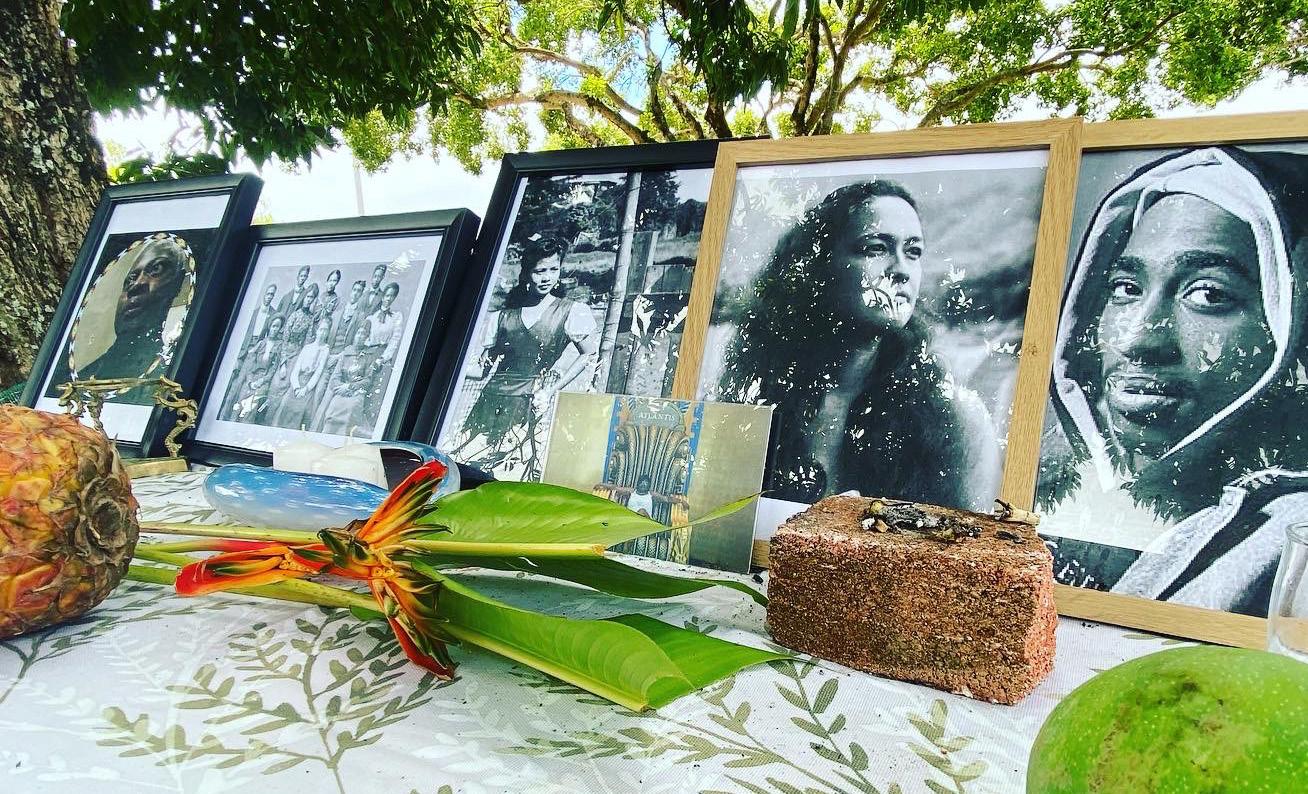
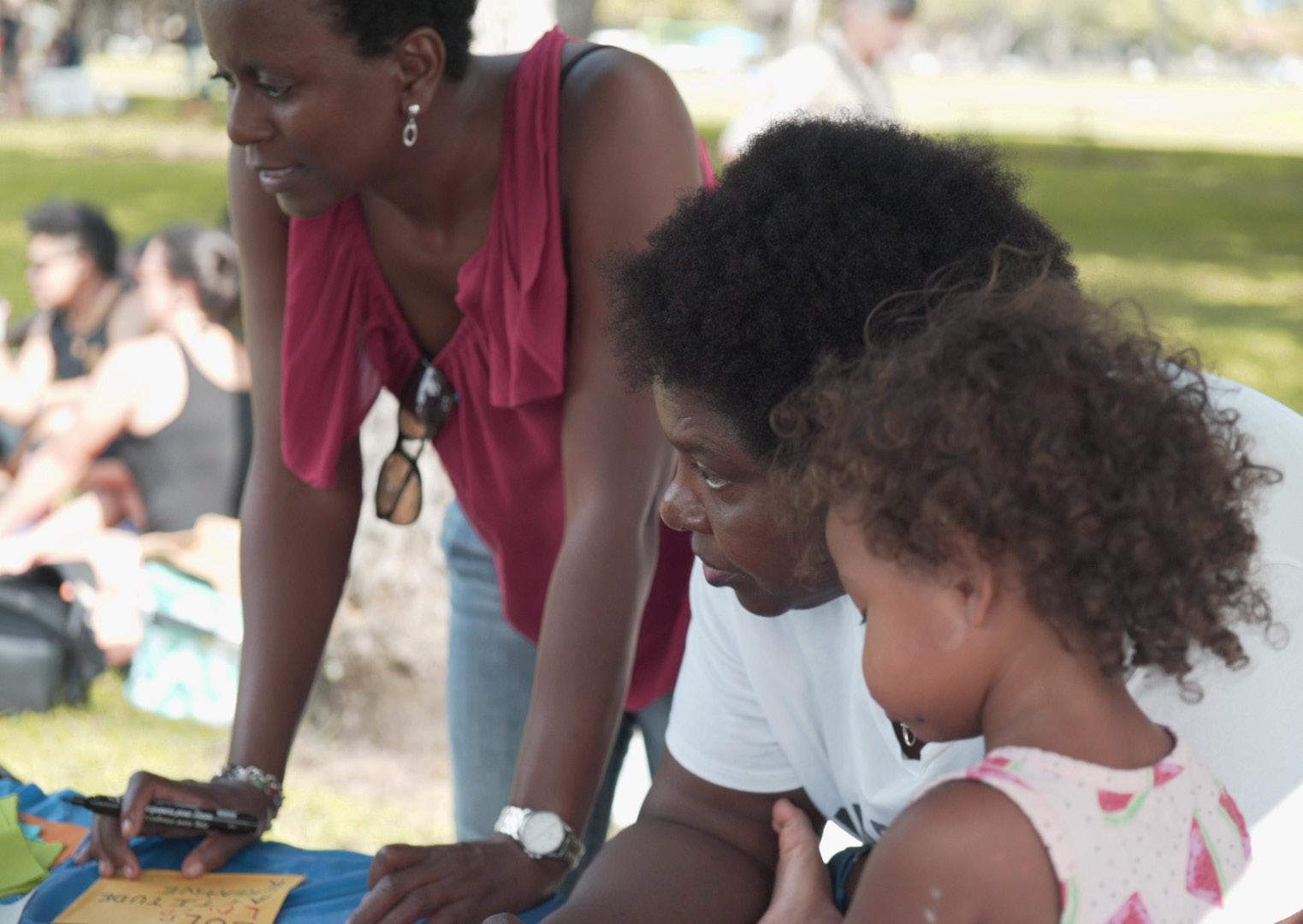
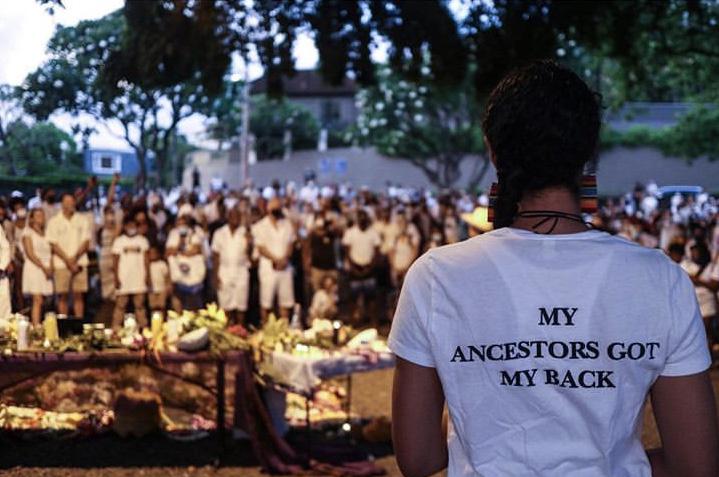 Juneteenth celebrations at Mākālei Park, 2020
Juneteenth artmaking at Kapiʻolani Park, 2018
Juneteenth celebrations at Mākālei Park, 2020
Juneteenth artmaking at Kapiʻolani Park, 2018
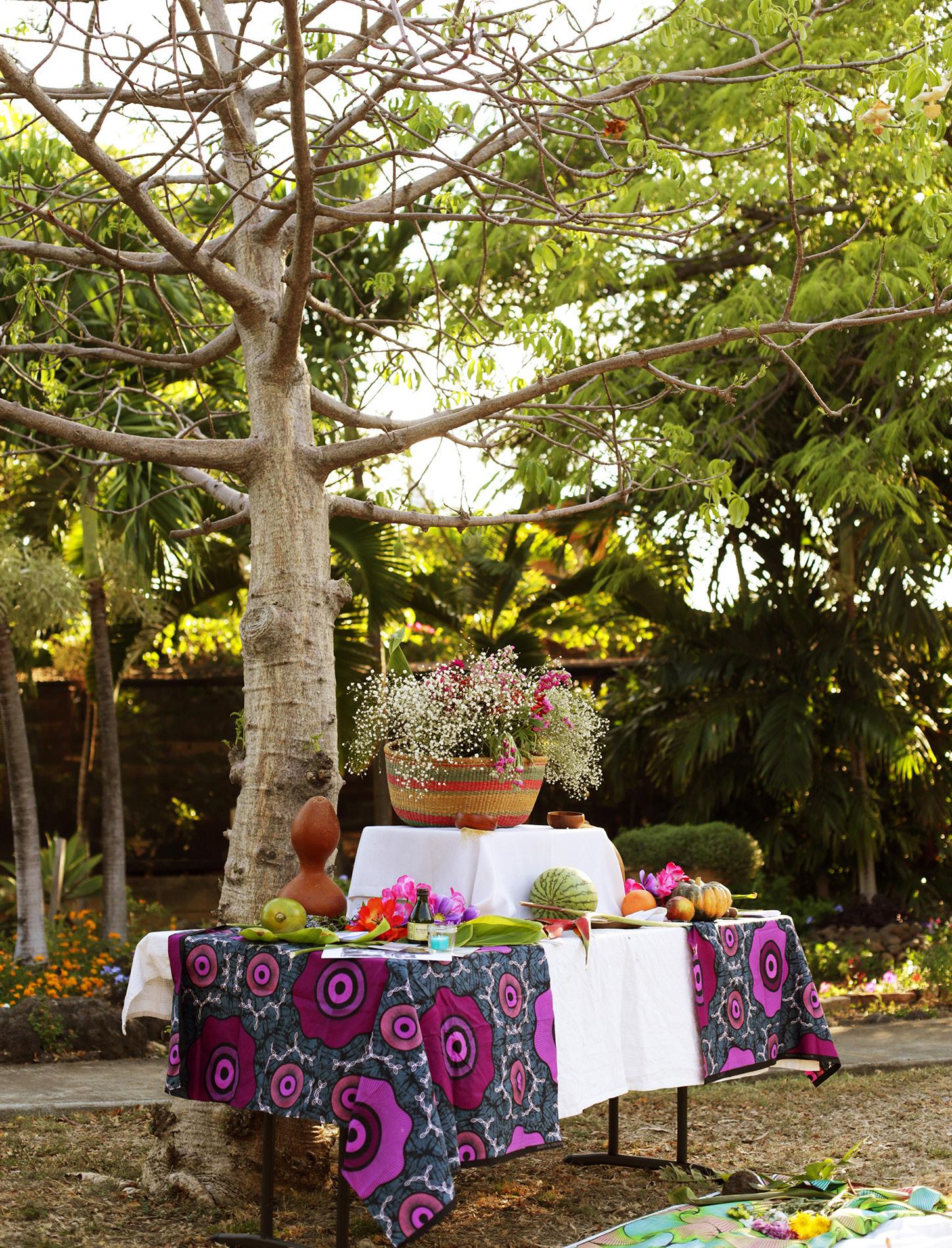 Juneteenth celebration at Kahumana Farms, 2022
Juneteenth celebration at Kahumana Farms, 2022
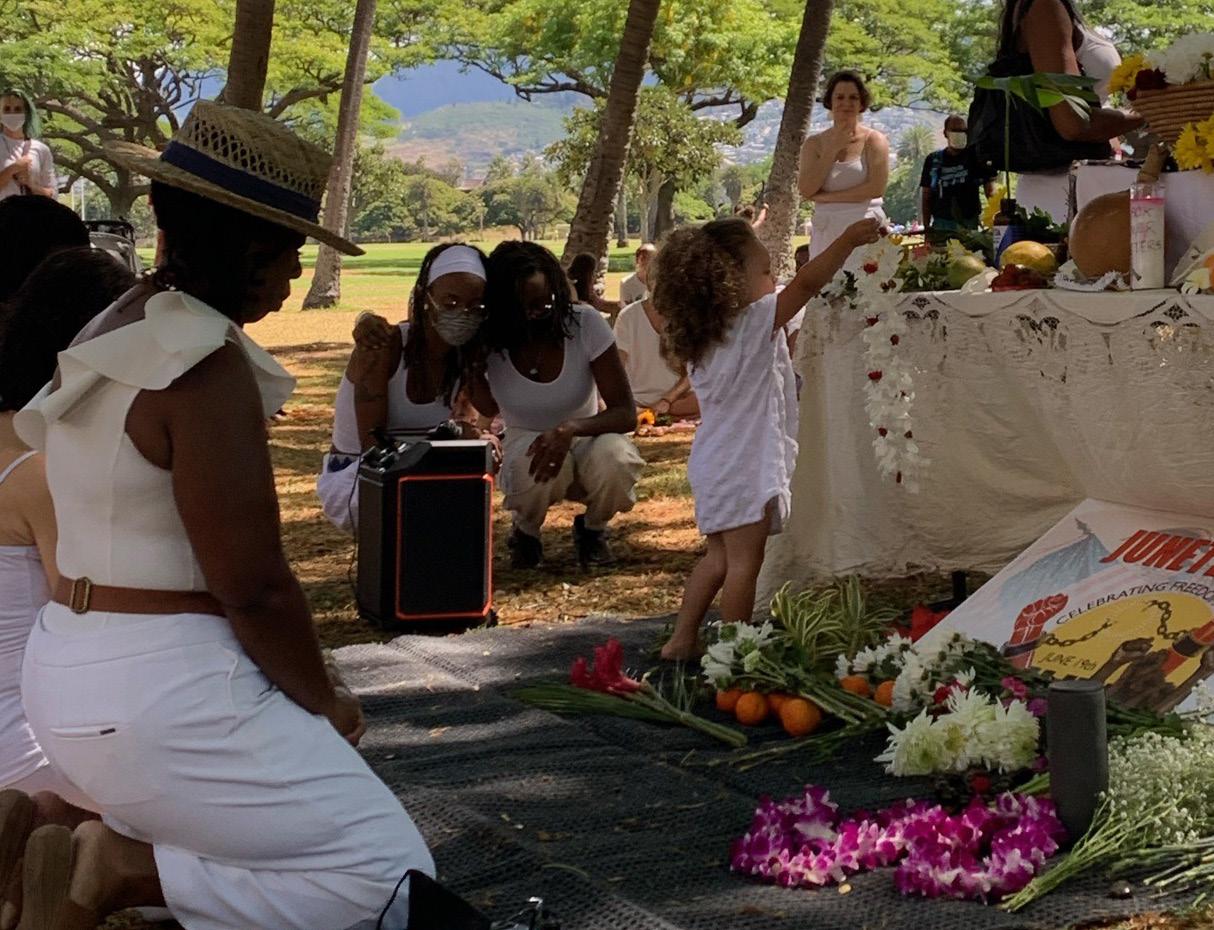
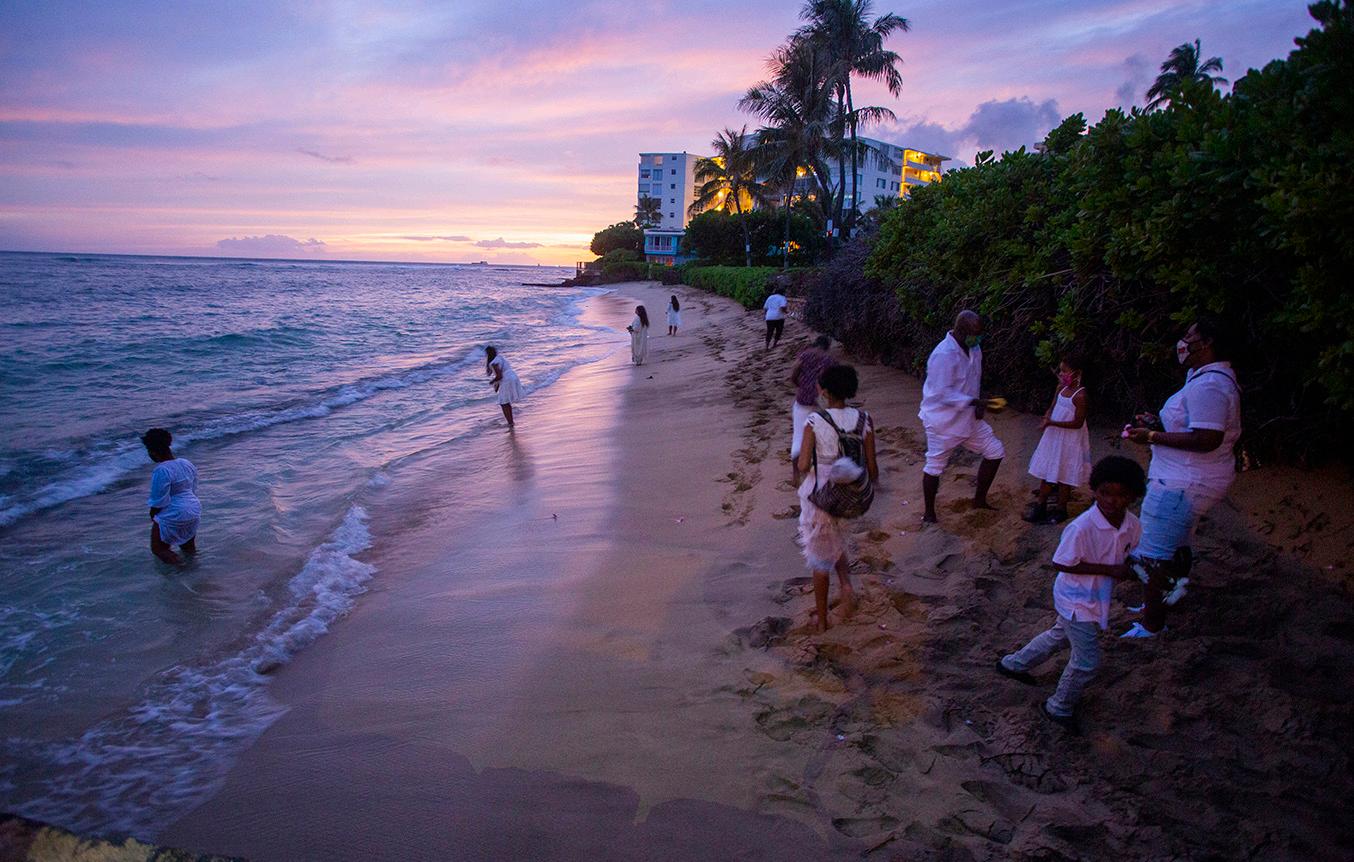 Juneteenth celebrations at Mākālei Park, 2020
Juneteenth celebration at Kapiʻolani Park, 2021
Juneteenth celebrations at Mākālei Park, 2020
Juneteenth celebration at Kapiʻolani Park, 2021
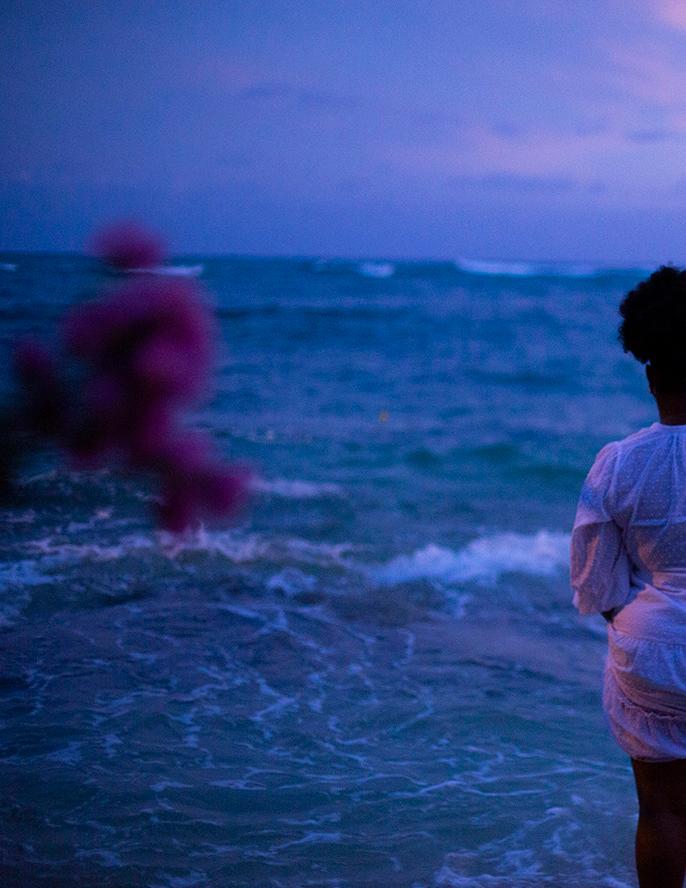
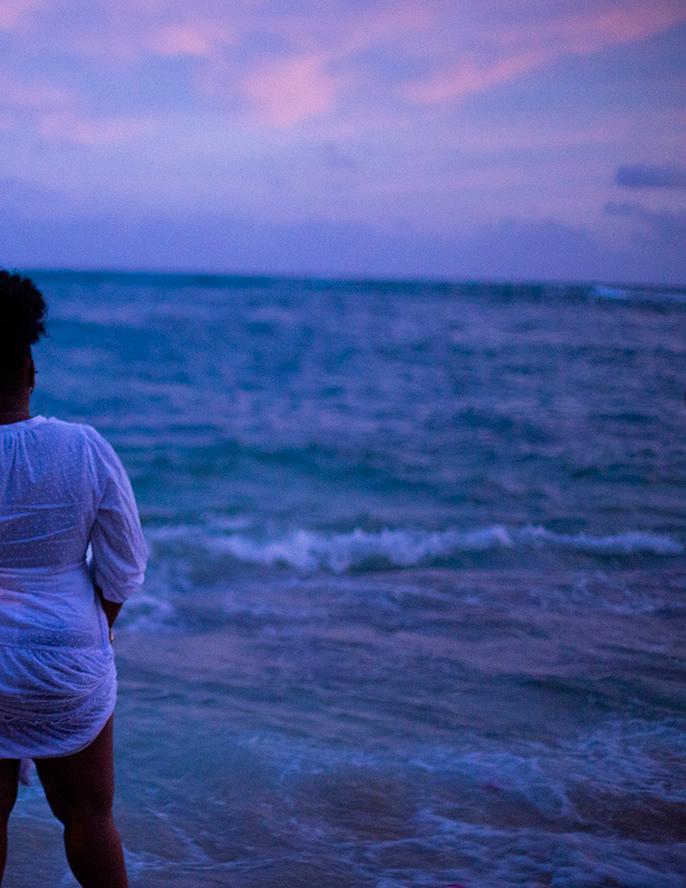 Juneteenth celebrations at Mākālei Park, 2020
Juneteenth celebrations at Mākālei Park, 2020
Joy connects us to each
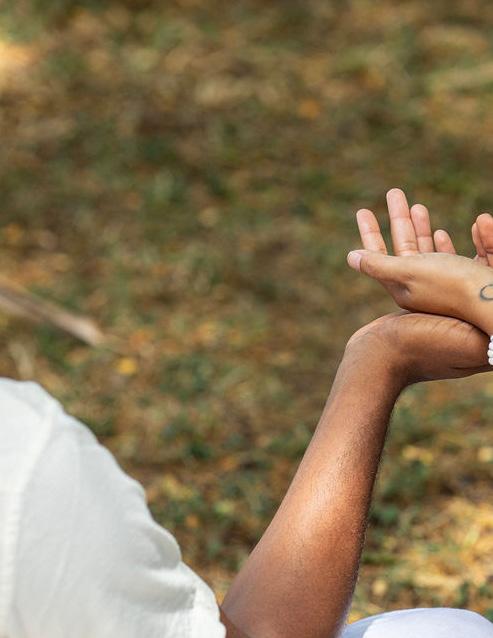 Juneteenth celebration at Kapiʻolani Park, 2023
Juneteenth celebration at Kapiʻolani Park, 2023
each other
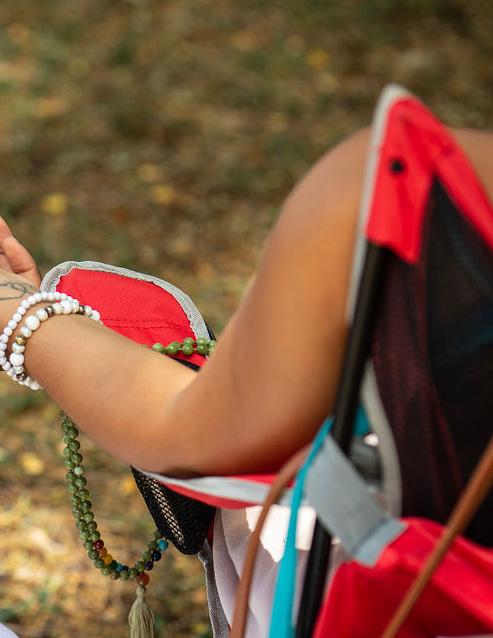

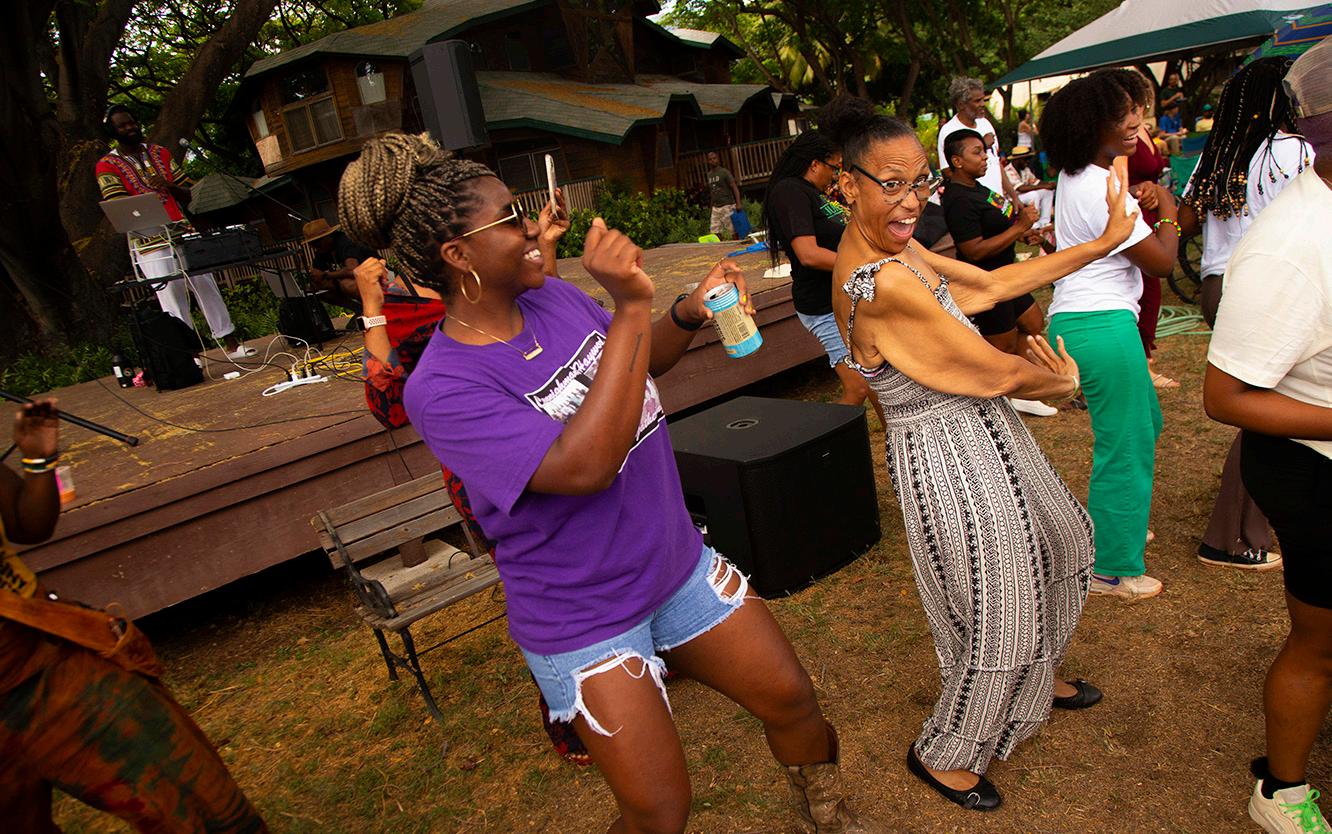 Juneteenth celebration at Kahumana Farms, 2022
Juneteenth celebration at Kahumana Farms, 2022
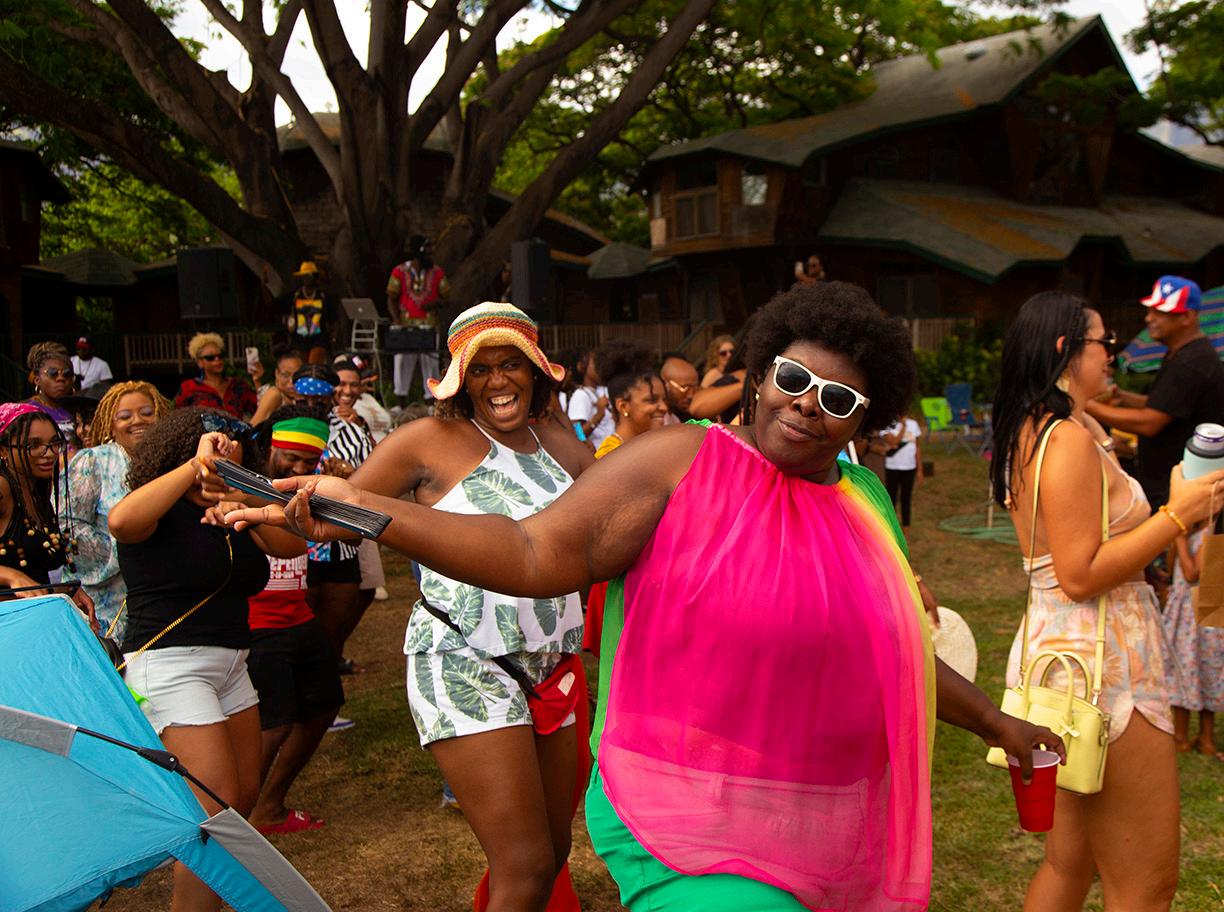
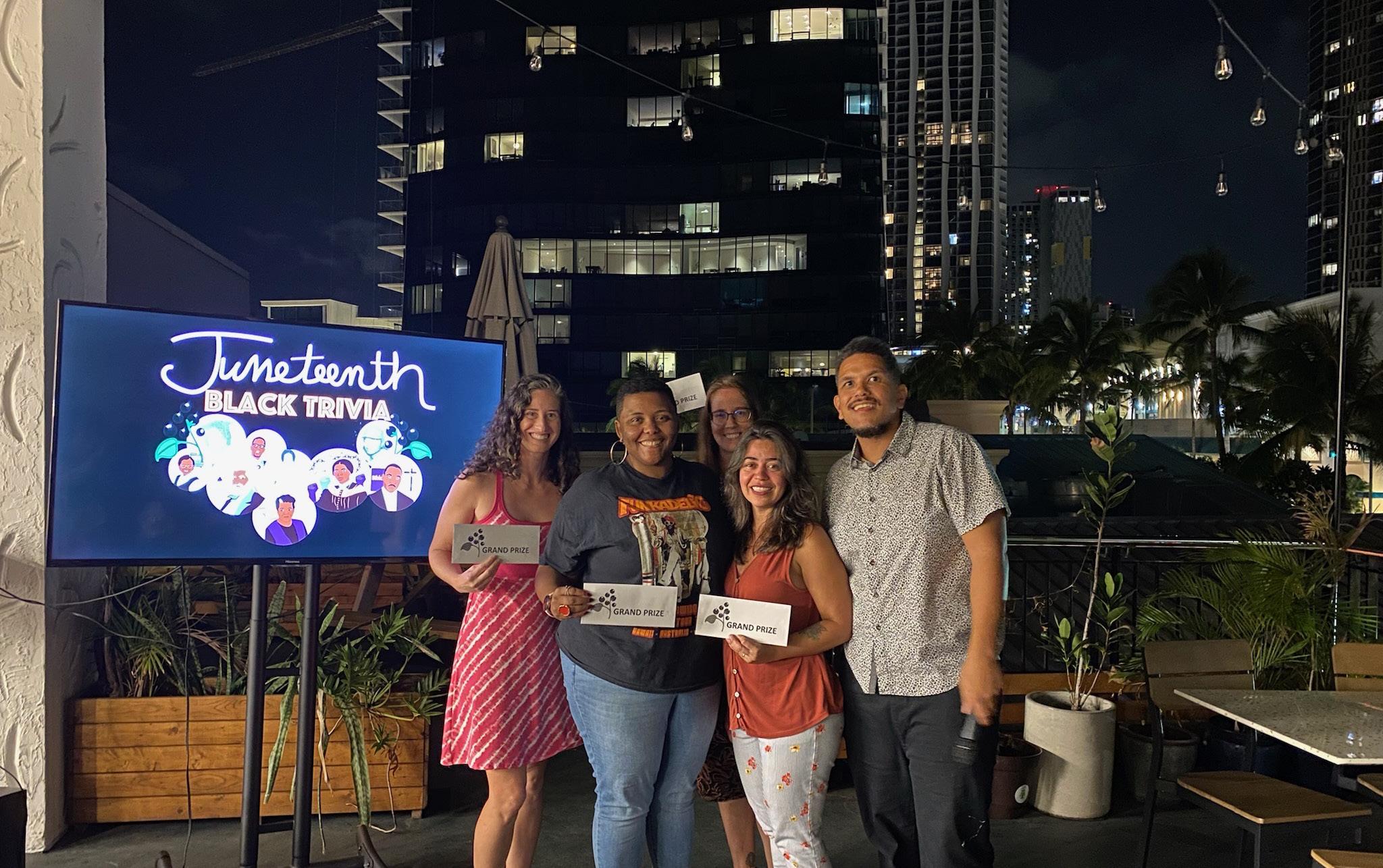 Juneteenth celebration at Kahumana Farms, 2022
Juneteenth Trivia Night at the Box Jelly, 2022
Juneteenth celebration at Kahumana Farms, 2022
Juneteenth Trivia Night at the Box Jelly, 2022
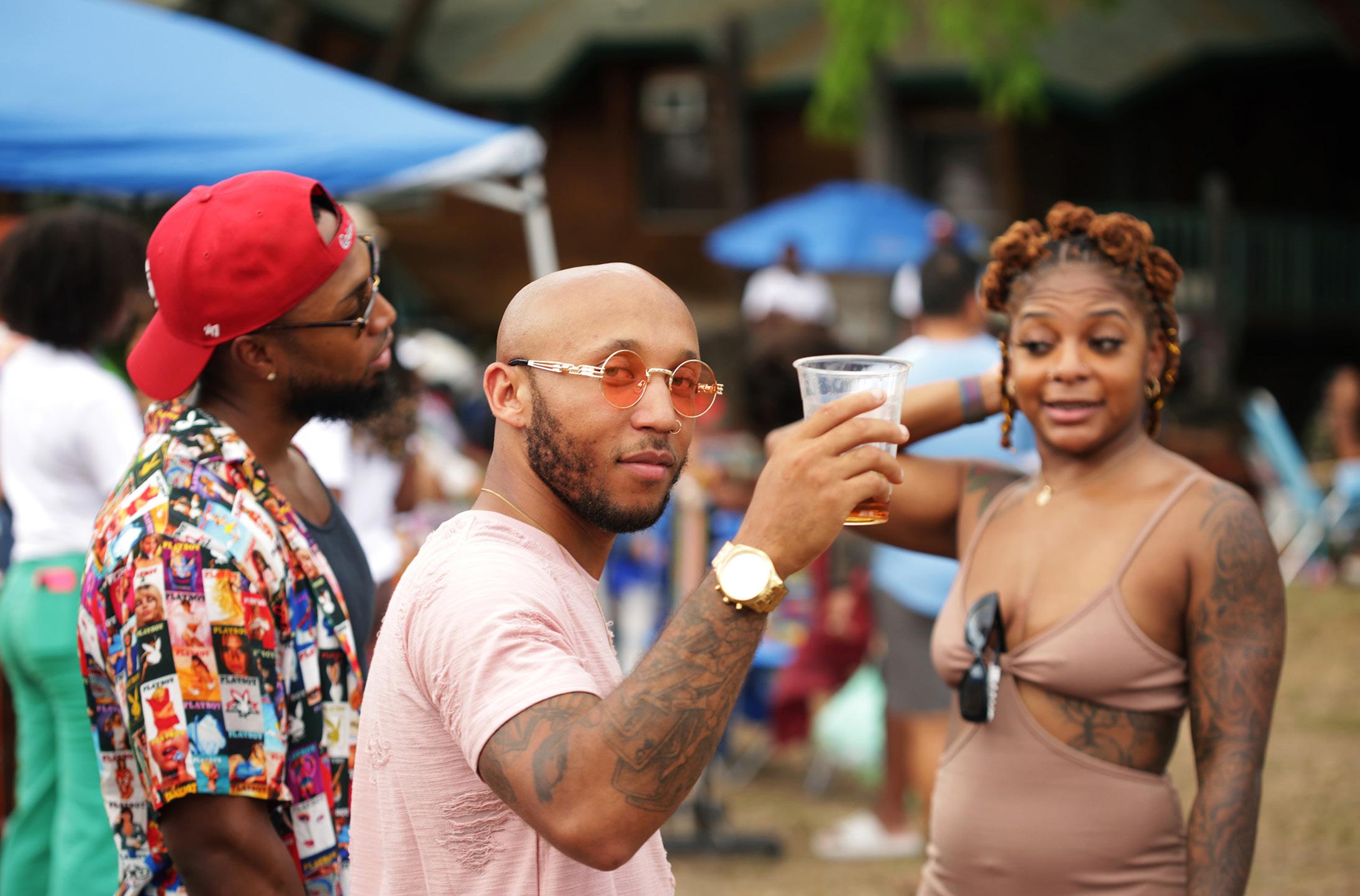
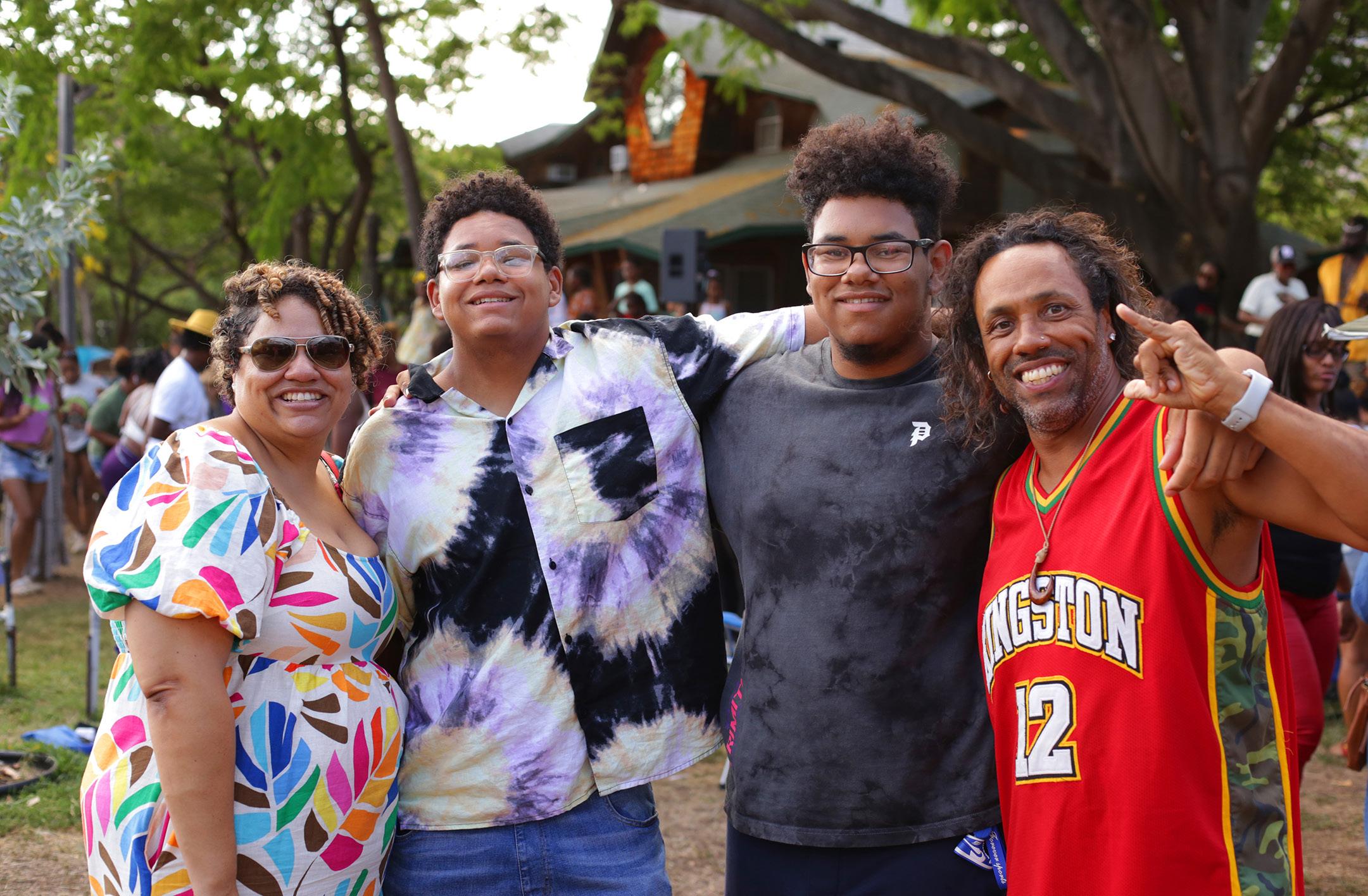 Juneteenth celebrations at Kahumana Farms, 2022
Juneteenth celebrations at Kahumana Farms, 2022
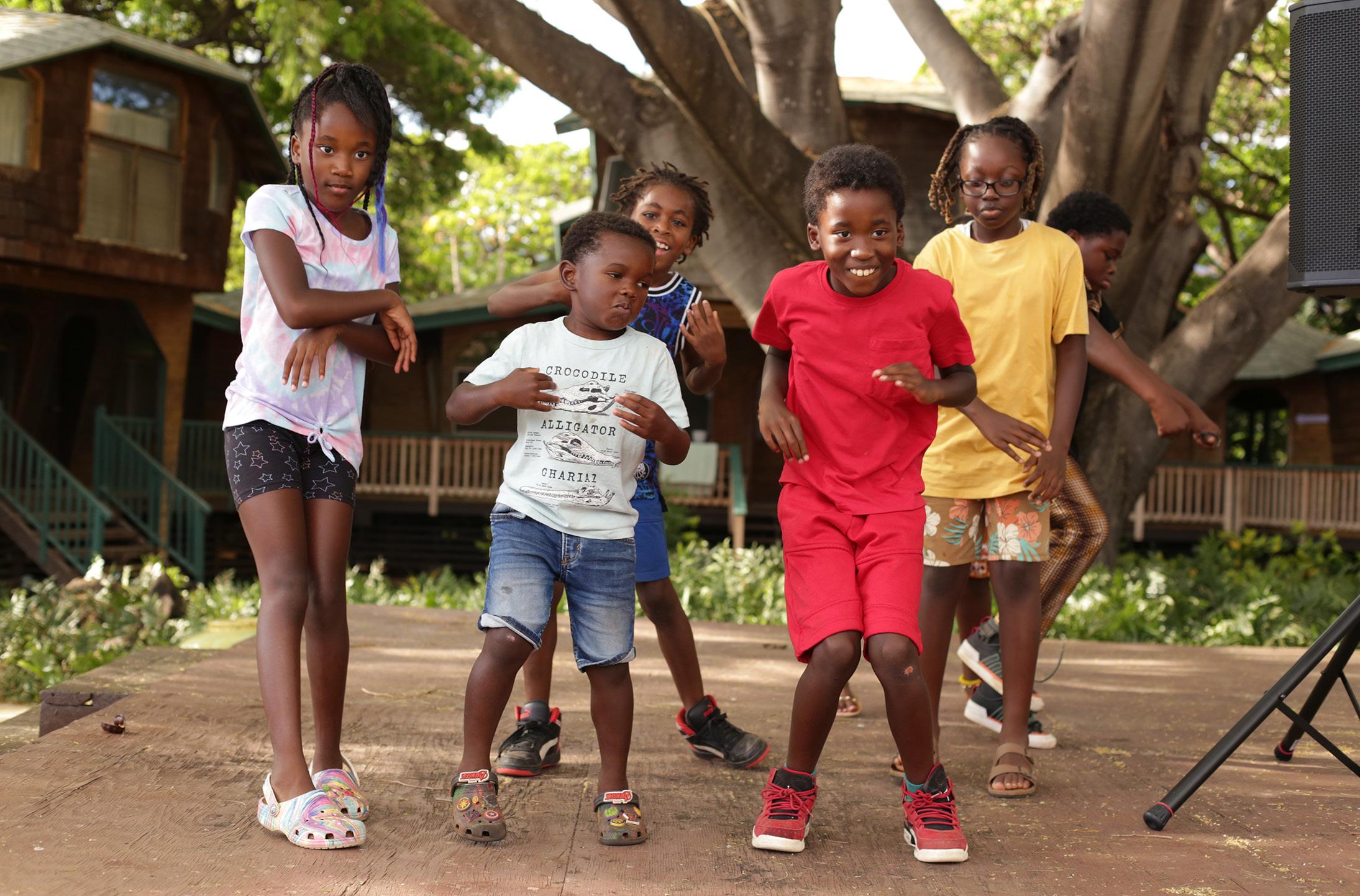
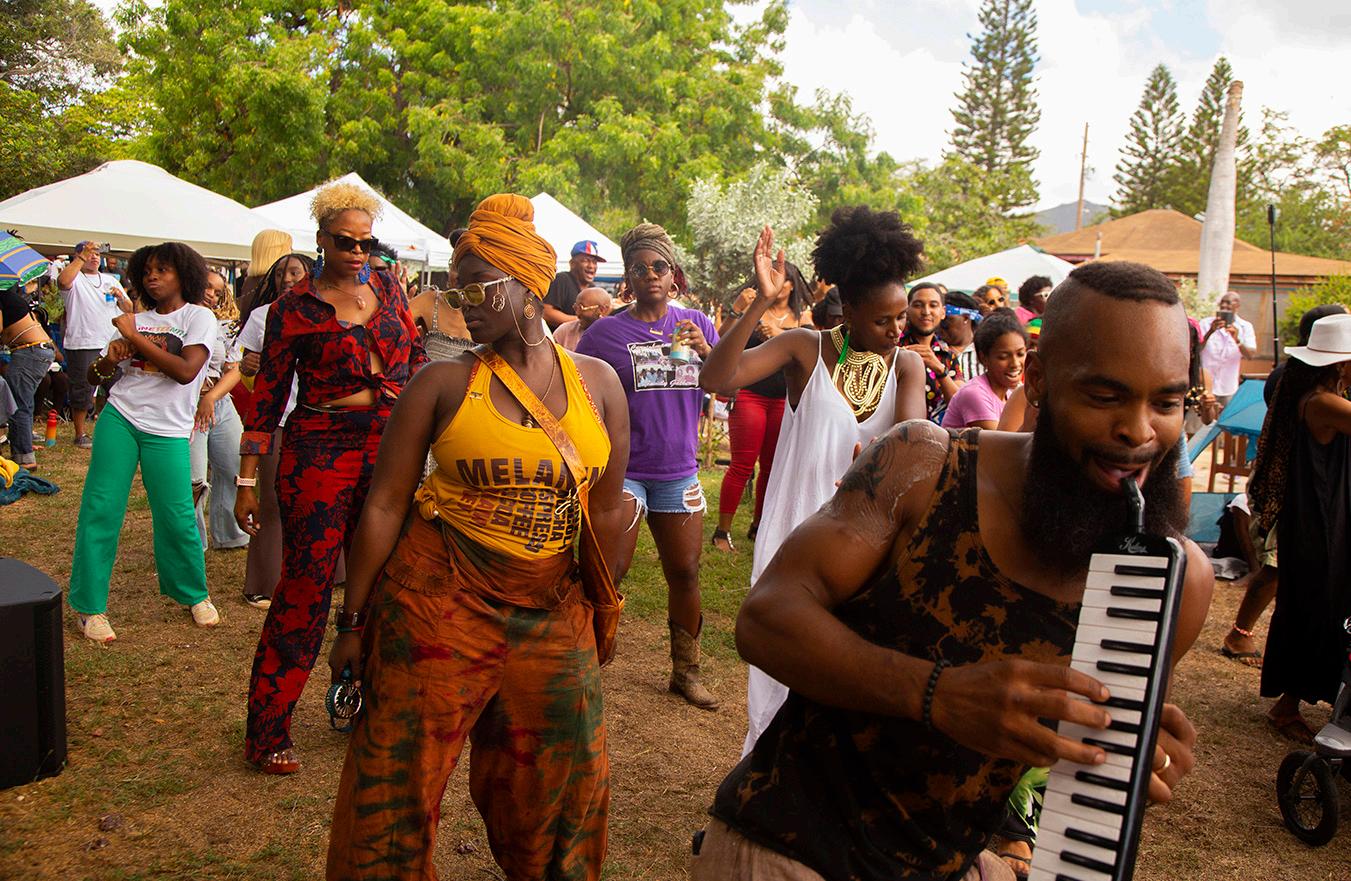
How can you support the community Juneteenth?beyond
1. Lift the diversity People since ethnic of the hiring whether represented
2. Seek or organization relationships in Hawaiʻi While are popular community connect throughout
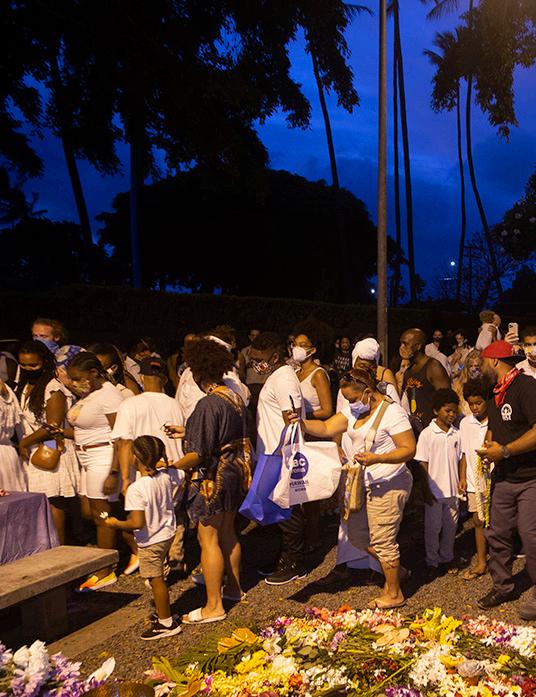 Juneteenth celebrations at Mākālei Park, 2020
Juneteenth celebrations at Mākālei Park, 2020
Lift up and make space for Black voices as part of diversity of a modern, inclusive Hawaiʻi
People of African descent have lived in Hawaiʻi since the early 19th century, predating many other ethnic communities we now think of as regular parts the Local fabric. In your visual communications, hiring practices, and organizational culture, consider whether and how the Black presence in Hawaiʻi is represented and supported.
Seek opportunities for your business organization to strengthen meaningful relationships with Black community organizations Hawaiʻi all year
While Juneteenth and Black History Month (February) popular times to explore the presence of the Black community in Hawaiʻi, take advantage of opportunities connect with Black organizations and leaders throughout the year.
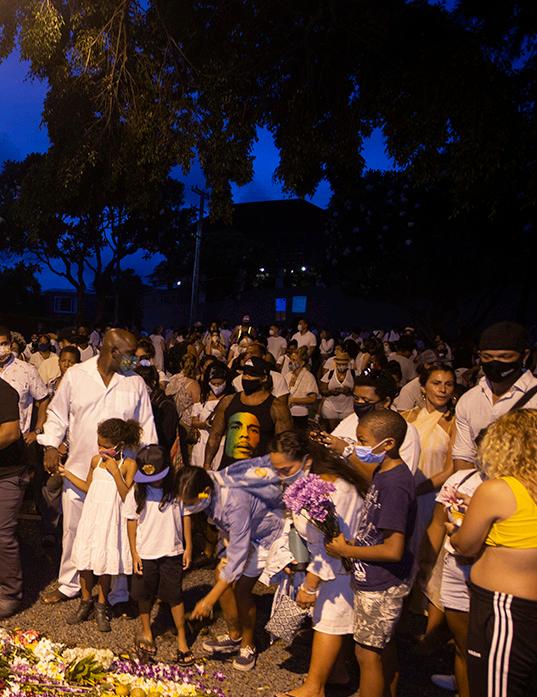
3. Learn more about Hawaiʻi’s history and how contemporary experiences of anti-Black racism impact Black people and others in Hawaiʻi Hawaiʻi is often described as a place free from racism and ethnic bias. However, many communities are negatively impacted by anti-Black ideas, whether or not they are of African descent. Learn more about how racist ideas have shaped Hawaiʻi and harmed Native Hawaiians, other Pacific Islanders, and Black people from the overthrow to the present day. Take action to educate others and do what you can to make change in our commnity.
4. Consider materially supporting Black community organizations in Hawaiʻi
Historically, due to structural and systemic inequality, Black-led and Black-serving organizations are disadvantaged in philanthropic giving despite proven track records of delivering on social impact. Your business or organization’s donation to a Black-led nonprofit supports equity work that ultimately benefits everyone in our society.
Who we are
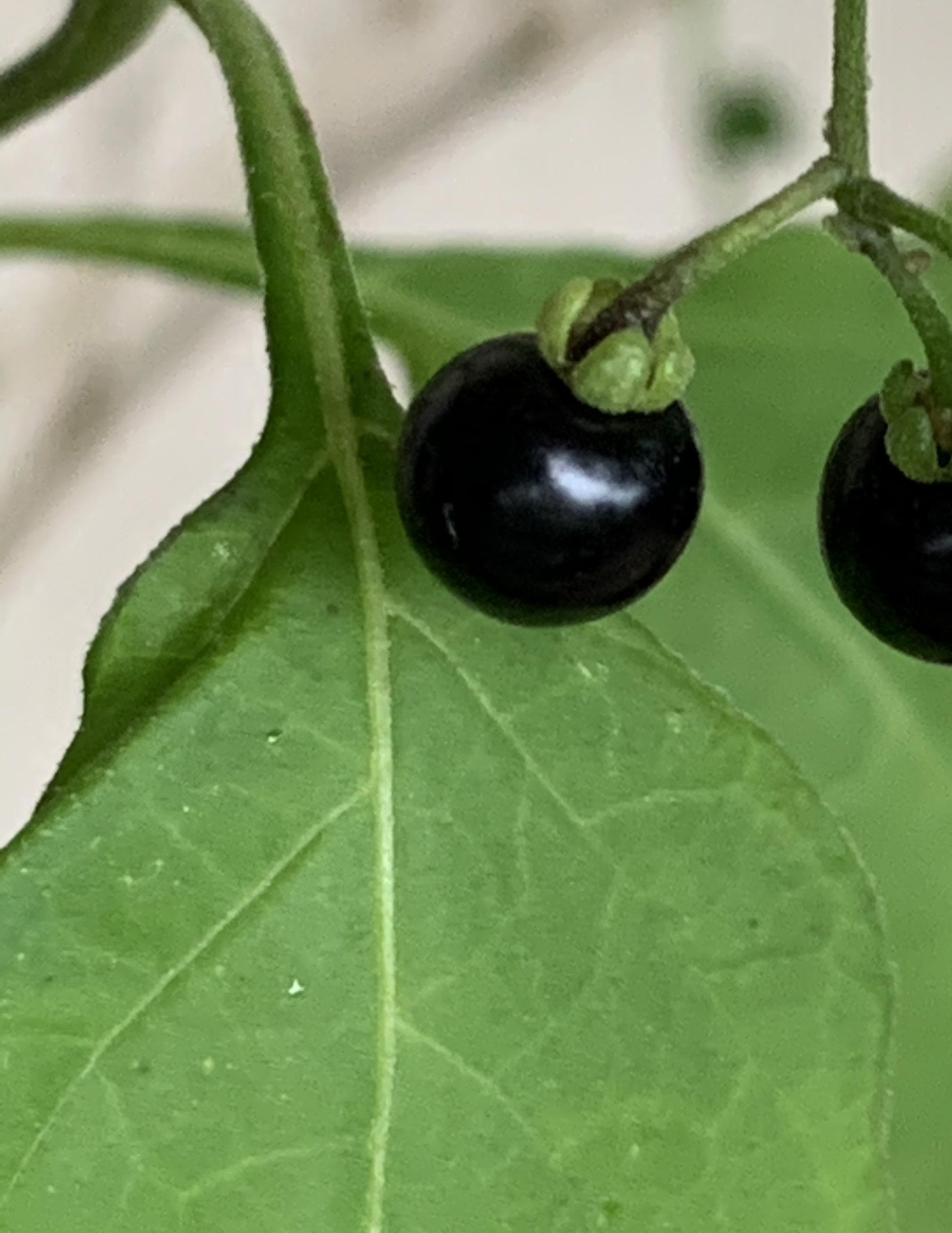
The Pōpolo Project is a Hawaiʻi-based 501(c)(3) nonprofit organization founded in 2017. Our mission is to redefine what it means to be Black in Hawaiʻi through creating profound reconnection to ourselves, our community, our ancestors, and the land.
We envision a just and inclusive future for Hawaiʻi, brought forward by intentionally building connections between communities. We do that through educational and cultural learning experiences that create new narratives about Blackness and Black people here and across our Pacific region. Black people are about 3.8% of Hawaiʻi’s population and, despite our small numbers, we represent incredible
ethnic, socioeconomic, gender, and political diversity. Our cultures and histories in Hawaiʻi link to global questions of race and belonging in profound ways.
Our name comes from the Hawaiian word pōpolo , a traditionally valued native plant that produces deep purple berries used in medicine and kapa dyeing. In Hawaiian slang since the midnineteenth century, the plant’s name has been applied to Black people on the analogy of the dark color of the fruit and the color of our skin. In our usage, we see an opportunity to interrupt how this Hawaiian word and plant have been appropriated by white supremacy and instead link to the many layers of kaona in pōpolo’s healing and creative power.
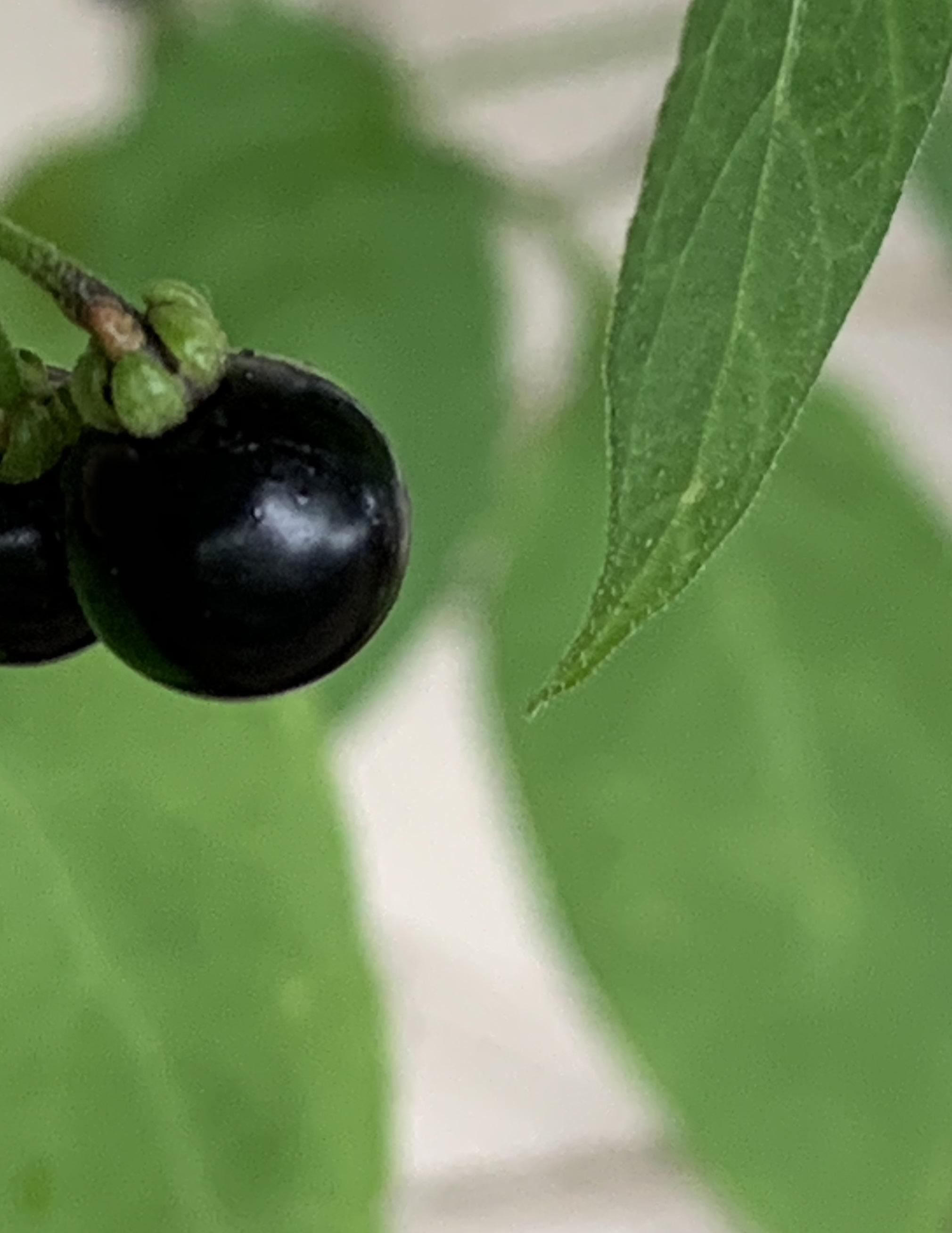
Redefining what it means to be Black in Hawai‘i and in the world through cultivating radical reconnection to ourselves, our community, our ancestors, and the land, changing what we commonly think of as Local and highlighting the vivid, complex diversity of Blackness.
